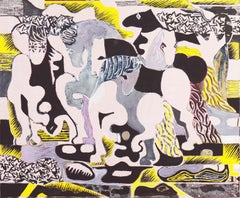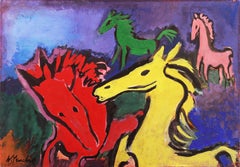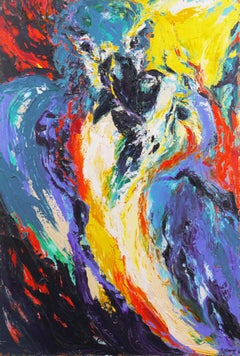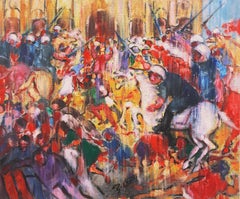Want more images or videos?
Request additional images or videos from the seller
1 of 12
Clement Samuel Wilenchick'Ponies Dancing' California Post-Impressionist, San Francisco Art AssociationCirca 1955
Circa 1955
$3,500List Price
About the Item
- Creator:Clement Samuel Wilenchick (1900 - 1957, American)
- Creation Year:Circa 1955
- Dimensions:Height: 15.5 in (39.37 cm)Width: 22.25 in (56.52 cm)
- Medium:
- Movement & Style:
- Period:
- Condition:minor restoration, minor losses; unframed.
- Gallery Location:Santa Cruz, CA
- Reference Number:1stDibs: LU3442703581
About the Seller
5.0
Gold Seller
Premium sellers maintaining a 4.3+ rating and 24-hour response times
Established in 1982
1stDibs seller since 2013
750 sales on 1stDibs
Typical response time: 1 hour
Authenticity Guarantee
In the unlikely event there’s an issue with an item’s authenticity, contact us within 1 year for a full refund. DetailsMoney-Back Guarantee
If your item is not as described, is damaged in transit, or does not arrive, contact us within 7 days for a full refund. Details24-Hour Cancellation
You have a 24-hour grace period in which to reconsider your purchase, with no questions asked.Vetted Professional Sellers
Our world-class sellers must adhere to strict standards for service and quality, maintaining the integrity of our listings.Price-Match Guarantee
If you find that a seller listed the same item for a lower price elsewhere, we’ll match it.Trusted Global Delivery
Our best-in-class carrier network provides specialized shipping options worldwide, including custom delivery.You May Also Like
KOI 1
Located in Zofingen, AG
In this creation, I merged the fluidity of acrylics with the richness of oils, embracing both expressionism and impressionism to capture the spirited essence of a koi fish. Through s...
Category
2010s Expressionist Animal Paintings
Materials
Oil, Acrylic, Cardboard
BIRD 20
Located in Zofingen, AG
In this vibrant fusion of acrylic and oil, I harnessed the raw, emotive power of expressionism with the subtle delicacy of impressionism to capture the essence of resilience and vigi...
Category
2010s Expressionist Animal Paintings
Materials
Oil, Acrylic, Cardboard
KOI 2
Located in Zofingen, AG
In this vibrant blend of expressionism and impressionism, I used acrylic and oil to capture the dynamic essence of life, loosely inspired by the fluid, ever-changing nature of existe...
Category
2010s Expressionist Animal Paintings
Materials
Oil, Acrylic, Cardboard
BIRD 19
Located in Zofingen, AG
In this piece, I've melded acrylic and oil to capture the frailty yet resilience of nature, through a burst of textured strokes embodying both expressionism and impressionism. The ey...
Category
2010s Expressionist Animal Paintings
Materials
Oil, Acrylic, Cardboard
JOY. Cats original painting
Located in Zofingen, AG
In this vibrant artwork, I channel the whimsy of expressionism with touches of impressionism and pop art to create a playful scene that bursts with joy and curiosity. Using acrylics ...
Category
2010s Expressionist Animal Paintings
Materials
Canvas, Oil Pastel, Acrylic, Cardboard
Two in a Boat
Located in Zofingen, AG
In this piece, I've woven vivid expressionism with a hint of pop art's boldness, contrasting with the subtlety of impressionism. With acrylic and oil, I depict an enchanting voyage o...
Category
2010s Expressionist Animal Paintings
Materials
Oil Pastel, Acrylic, Cardboard
Still Life Painting with Chicken by Fauvist British Artist
By Steve Capper
Located in Preston, GB
Still Life Painting with Chicken by Fauvist British Artist, Steve Capper
Art measures 20 x 24 inches
Frame measures 25.5 x 30 inches (approx.) ...
Category
2010s Expressionist Still-life Paintings
Materials
Canvas, Paint, Cotton Canvas, Mixed Media, Acrylic, Board
$2,479 Sale Price
20% Off
H 30 in W 25.5 in D 2 in
Wolfenstein, Original Painting
Located in San Francisco, CA
Artist Comments
A stylized wolf emerges from bold, angular brushstrokes. Its cool blue and icy white fur contrasts sharply against the glowing red backdrop. Layered paint and s...
Category
21st Century and Contemporary Expressionist More Art
Materials
Acrylic
Unfinished Ram
Located in Aramits, Nouvelle-Aquitaine
Robert Kitchen, American (1949 - 2009)
Unfinished Ram, 2009
Acrylic on canvas, unframed, signed on back with the estate stamp.
Robert Kitchen was born ...
Category
Early 2000s Expressionist Animal Paintings
Materials
Acrylic
Strike a pose - Joanna Flatau, Contemporary art, Expressionist painting
By Joanna Flatau
Located in Paris, FR
Part of "The Avignon Ladies" series
Acrylic paint on canvas
Signed
Unique work
Joanna Flatau was born in Varsaw, Poland.
She graduated from Varsaw History of Arts University and f...
Category
2010s Expressionist Figurative Paintings
Materials
Canvas, Acrylic
$11,431
H 51.19 in W 39.38 in D 1.97 in
More From This Seller
View All'Modernist Equestrian', WPA Murals, Kansas City Art Institute, PAFA, Horses
By Eduard Buk Ulreich
Located in Santa Cruz, CA
Signed lower right, 'Buk' for Eduard Buk Ulreich (American, 1889-1966), dedicated lower right, 'Made for Ruth M.' and painted circa 1945. Titled verso 'Birds in Flight', additionally...
Category
1940s Animal Paintings
Materials
Acrylic, Gouache, Illustration Board
'Ponies Dancing' California Post-Impressionist, San Francisco Art Association
By Clement Samuel Wilenchick
Located in Santa Cruz, CA
Signed lower left, 'Wilenchick' for Clement Samuel Wilenchick (American, 1900-1957) and painted circa 1955.
A dynamic, post-impressionist oil showing horses frolicking together agai...
Category
1950s Animal Paintings
Materials
Acrylic, Board
'Pair of Perroquets', Large, Expressionist Oil, Parrots, Detroit Woman artist
Located in Santa Cruz, CA
Signed lower right, 'R. Hornak' for Rosemary Hornak (American, born 1951); additionally signed verso, titled 'Perroquets Impasto, Variation 2' and dated 1992.
Rosemary Hornak receiv...
Category
1990s Expressionist Animal Paintings
Materials
Masonite, Oil
'Massacre of Tlatelolco', Plaza de las Tres Culturas, Mexican Olympics, Rio MAM
By Benjamin Silva
Located in Santa Cruz, CA
Signed lower center with artist monogram, 'B.S.' for Benjamin Silva (Brazilian, born 1927) and dated with roman numerals, 1968; additionally signed, verso, dated and titled.
A dram...
Category
1960s Expressionist Figurative Paintings
Materials
Canvas, Oil
'Tropical Fish', Psychedelic Piscatorial, Aquatic
Located in Santa Cruz, CA
Signed lower right, 'Murray' and painted circa 1990.
A large and vibrant study of three colorful fishes shown stacked vertically.
Category
1990s Modern Animal Drawings and Watercolors
Materials
Wax Crayon, Acrylic, Watercolor, Gouache, Laid Paper
'Under the Full Moon', North Beach, San Francisco Bay Area, Camel, Romance
Located in Santa Cruz, CA
Signed lower left, 'Glen Chesnut' (American, 1930-2017) and dated 1991.
Born in Amarillo, Texas, Glen Chesnut was the youngest of six children. In 1935, the Chesnut family moved to ...
Category
1990s Landscape Paintings
Materials
Acrylic, Laid Paper
Recently Viewed
View AllMore Ways To Browse
Balloon Animal
Black Bull Paintings
Chicks Painting
Cow Paintings On Canvas
Egret Painting
Panda Painting
Red Bunny
Unicorn Painting
Abraham Lincoln Portrait
Arabian Horse Art
Calf Painting
Cheetah Paintings
Donkey Oil Painting
Golden Retriever
Highland Cattle Painting
Hunt Slonem White Bunny
Hunting Dogs Oil Painting
Jockey Silks



